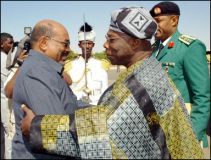Nigerian leader vows AU will secure Darfur peace
By Opheera McDoom
EL-FASHER, Sudan, Jan 8 (Reuters) – Nigerian President Olusegun Obasanjo vowed on Saturday the African Union would not give up efforts to bring peace to Sudan’s western Darfur region, despite ceasefire violations and months of failed talks.

|
|
Sudanese President Omar al-Beshir (L) sees off his Nigerian counterpart Olusegun Obasanjo at Khartoum international airport, Jan 8, 2008 (AFP). |
Thousands of Darfuris chanting “No to war, Yes to peace” gave the African Union (AU) chairman a rapturous reception when he arrived in El-Fasher in northern Darfur, headquarters of the AU’s ceasefire monitoring operations in the vast arid region.
“I want to give you one assurance on behalf of Nigeria and the AU. We will not rest until there is peace and perfect peace in Darfur and in the whole of Sudan,” Obasanjo told the crowd.
Sudan’s government and Darfur rebels suspended AU-sponsored peace talks in the Nigerian capital Abuja last month. Both main rebel groups have expressed dissatisfaction with the AU’s handling of the negotiations.
Festus Okonkwo, Nigerian commander of AU forces in Darfur, said violence in western Sudan had been muted since the end of the Abuja talks but the total of ceasefire violations by both sides was approaching 100.
U.N. Secretary-General Kofi Annan warned on Friday there could be “intense violence” in Darfur, where tens of thousands have already been killed and nearly 2 million have been forced to flee their homes, unless swift action was taken.
LONG SIMMERING CONFLICT
The Darfur rebellion began in February 2003 after years of tribal conflict over scarce resources. The rebels accused the government of neglect and of using Arab militias, known as Janjaweed, to loot and burn non-Arab villages.
Khartoum acknowledges arming some militias to fight rebels but denies any links to the Janjaweed, calling them outlaws.
The chaotic security situation in Darfur has hampered the work of relief agencies trying to reach an estimated 2.3 million people reliant on aid to survive.
Sudanese Agriculture Minister Majzoub al-Khalifa, who headed Khartoum’s delegation to the Abuja talks, told Obasanjo and the crowd in El-Fasher the government would carry on negotiating until there was a final peace deal.
Before Obasanjo’s arrival, about 80 Nigerian troops landed at El-Fasher airport to join the AU monitoring force. AU officials said the AU troop presence now totalled nearly 1,200.
A senior AU official said the full force of 3,300 soldiers should be deployed by the end of February, adding troop arrivals had previously been delayed due to a lack of camps.
Okonkwo said a splintering of the Darfur rebel groups was a worry. “Everyone is concerned about this,” he said.
Rebels from a new group, the Sudanese National Movement for the Eradication of Marginalisation, claimed responsibility for an attack last month on an area neighbouring Darfur.
The government and some observers have said the group is a front for one of the main rebel groups, the Sudan Liberation Army (SLA).
“The attacks are outside Darfur so the government told us they are dealing with this,” Okonkwo said. The AU mission in Darfur does not cover incidents outside the region.
The AU recognises the SLA and the other main rebel group, the Justice and Equality Movement (JEM), and the National Movement for Reform and Development, which split from JEM and agreed to respect a ceasefire after talks with Khartoum.
“If we recognise too many groups, then more groups will take up arms. So the AU will not recognise any more groups,” said Okonkwo.
Nigerian officials said Obasanjo, who also visited Khartoum, would return to Nigeria instead of going to Kenya to attend the signing on Sunday of a peace deal to end a 21-year-old civil war in the south of Sudan. They gave no reason.
